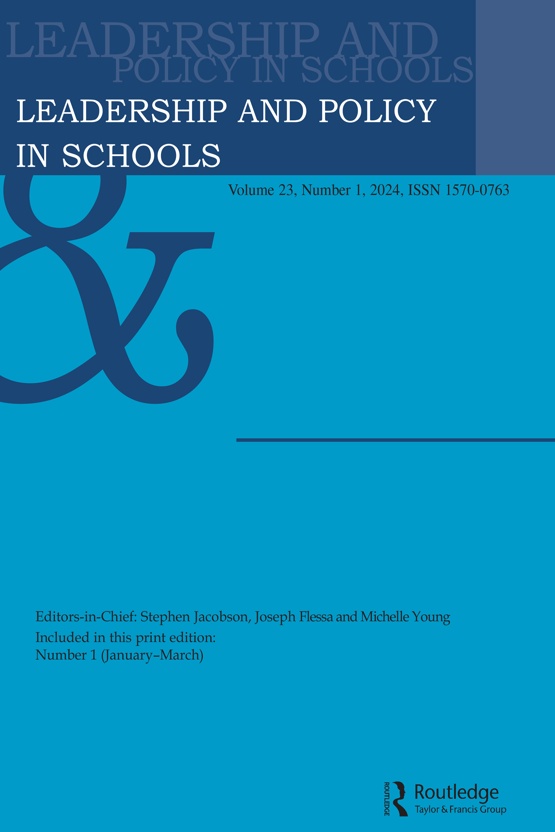Submit a Manuscript to the Journal
Leadership and Policy in Schools
For a Special Issue on
Reimagining School Leadership and Policy in the Digital and Artificial Intelligence (AI) Era
Abstract deadline
15 May 2024
Manuscript deadline
01 August 2024

Special Issue Editor(s)
Dr. Khalid Arar,
Editor in Chief, Leadership and Policy in Schools
[email protected]
Dr. Ahmed Tlili,
Beijing Normal University
[email protected]
Dr. Soheil Salha,
An-Najah National University
[email protected]
Dr. Anna Saiti,
West Attica University
[email protected]
Reimagining School Leadership and Policy in the Digital and Artificial Intelligence (AI) Era
In an era marked by rapid advancements in digital literacy and artificial intelligence (AI), the traditional paradigms of school
leadership and policy face unprecedented challenges and opportunities. This special issue seeks to explore the transformative impact of these technologies on educational leadership and policy, aiming to advance theoretical and practical knowledge across various educational contexts.
In our call, we encompass a wide range of considerations including covering the following main themes:
(1) Equitable Access: Addressing disparities in access to technology and ensuring that all students have equal opportunities to benefit from digital and AI-enabled learning experiences;
(2) Curriculum Design: Adapting curriculum frameworks to include digital literacy and AI education, preparing students to thrive in a technology-driven society;
(3) Integration of Technology in schools nowadays: How school leaders incorporate digital tools and AI-powered systems into teaching, learning and making decision practices to enhance educational outcomes;
(4) Professional, and community capital development: Providing training and support for educators and administrators to effectively utilize digital tools and AI technologies in their contexts;
(5) Identifying the ethics to be considered and addressed for the safe and effective adoption of AI in educational leadership: developing policies to safeguard involved stakeholders (e.g., students, educators, administrators, etc.) and ensure the responsible use of AI algorithms in educational settings;
(6) Ethical Considerations: Promoting discussions around the ethical implications of AI in education, such as algorithmic bias and the ethical use of student data;
(7) Collaboration and Partnerships: Fostering collaboration between schools, government agencies, industry partners, and community stakeholders to leverage AI-powered technology for educational improvement; and finally
(8) Policy Formulation: Developing policies at the local, regional, and national levels to guide the responsible integration of digital and AI technologies in educational leadership, while also addressing potential challenges and risks.
Overall, school leadership and policy in the digital AI era education requires a comprehensive understanding and involves proactive decision-making and strategic planning to harness the potential of technology while mitigating its risks, with the ultimate goal of enhancing teaching and learning outcomes for all students. Therefore, in our special issue, we invite authors to address the following (but not limited to) main questions:
- How has AI-powered technology shaped educational leadership?
- What ethics should be addressed to ensure responsible and human-centered AI in educational leadership?
- What policies and regulatory frameworks are needed to catalyze the adoption and safe integration of AI-powered technologies in educational leadership?
- How should human-machine collaboration and collaborative intelligence (human and artificial intelligence) be developed for the effective and safe distribution of tasks between human educational leaders and AI-powered technologies?
Looking to Publish your Research?
Find out how to publish your research open access with Taylor & Francis Group.
Choose open accessSubmission Instructions
This Special Issue (SI) aims to advance the theoretical and practical knowledge related to the use of AI-powered technologies in educational leadership. Solid research (including case studies, empirical studies, design-based research, design-based implementation research, and theoretical papers) across different educational levels (e.g., primary, secondary, etc.) and types (e.g., formal, informal, etc.) are welcome.
This special issue is intended for publication in January/February 2025 to capture the ongoing discourse. Authors are encouraged to be mindful of the expected timings of the submissions and/or revisions.
The editorial team will review abstract proposals and invite authors to prepare manuscripts based on the overall objectives of the issue and the promise of the submission.
Select "special issue" when submitting your abstract or paper to ScholarOne.
- Abstract submission (up to 400 words, excluding references): May 15, 2024
- Invitation to submit: May 30, 2024
- Notification of decisions: October 1, 2024
- Submission of revised manuscript: November 1, 2024